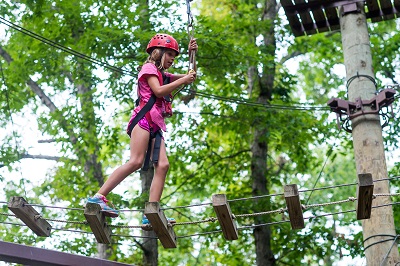Changing (throwing out?) the rules of Summer Camp
How we can run a summer camp with three rules and almost no "disciplinary" problems.
The history of humankind shows us that, as we gain information, we realize that the apparent differences between people are smaller than they seem at first. Societal change follows, as well. There was a time where society at large thought that it was okay to keep certain people as slaves, that women should not be able to vote, that those in the LGBTQ community were somehow less noble than those who weren’t. And now? We’ve moved past most of those ideas, and are moving past others.
But there’s one group of people that, by and large, is not considered in discussions around equality and privilege.
And that’s children.
At the Stomping Ground, we work to create a community that affords children the opportunity to be treated the way we, as adults, want to be treated. For years, we’ve created summer camping environments with just three rules:
1) No one can physically endanger anyone. 2) No one can tease or put down anyone else. 3) No one can do anything illegal (or generally horrifying to anyone’s parents).
And that’s it.
By having clear and consistent rules that everyone can agree on – and no rules designed for adult convenience – we’ve been able to create communities that are totally free of so many of the common value judgments placed on kids every day.
A new lens with which to see our summer campers
All of our interactions with children hope to answer yes to these questions:
1) Would we want to be interacted with this way? 2) When this child has fully developed cognitively, can I nearly guarantee that he or she will be grateful that we interacted with him or her this way?
When common situations are viewed through this lens, ways to approach the situation are often obvious.
Asking a child to brush his or her teeth, for instance, seems to be a loving request. Indeed, I am quite grateful my parents insisted on me brushing my teeth when I was younger. Likewise, I am glad I was not permitted to tease or bully other children (and that they not be permitted to do those things to me!). This sort of “regulation” was totally reasonable, and I would be happy to submit to similar regulation as an adult.
When rules fail
 Take another very common situation and contrast it with the previous examples: the child who has lost track of time and is now late for something. It is very common for an adult to look at that child with disgust as the child scrambles to get ready. The adult might say things like, “You’re holding everybody up! Everyone else is waiting outside. I told you we were leaving at 12:30! It’s 12:35! Let’s go let’s go let’s go!” This interaction is only benefiting the adult, and not the community as a whole. The adult feels like he or she has gained some control back over the situation and that however late the group will be will be lessened by the scolding being delivered. It might just feel good to release the anxiety that has welled up in the form of hurrying the child. It seems like a natural consequence for irresponsibility.
Take another very common situation and contrast it with the previous examples: the child who has lost track of time and is now late for something. It is very common for an adult to look at that child with disgust as the child scrambles to get ready. The adult might say things like, “You’re holding everybody up! Everyone else is waiting outside. I told you we were leaving at 12:30! It’s 12:35! Let’s go let’s go let’s go!” This interaction is only benefiting the adult, and not the community as a whole. The adult feels like he or she has gained some control back over the situation and that however late the group will be will be lessened by the scolding being delivered. It might just feel good to release the anxiety that has welled up in the form of hurrying the child. It seems like a natural consequence for irresponsibility.
But does it really solve anything? The group is already late. Rushing the child for a gain of a few seconds or minutes seems fairly drastic. Next time, the child may fear the adult’s wrath and get ready more promptly, but do the ends justify the means?
I can personally say I never want anyone to rush me when I am already late. Most of the time I know it, and rushing me only causes great feelings of distress and anxiety. When I look back to all the times I was rushed as a child, I certainly do not feel grateful. Since this example does not consistently mesh with our lens, we have an expectation that counselors will never rush a child. If a counselor group is consistently and disruptively late, the counselor takes measures to be ready more promptly next time. It’s amazing what a ten minute warning for departure can do!
Likewise, I don’t mind if an usher approaches me at a movie theater and asks me to use an “inside voice.” There are people enjoying a movie, and I am disrupting them. Seems totally fair. If I approached someone and was excitedly telling them a story and they chided me about an inside voice, however, I can’t imagine wanting to maintain a relationship with that person for very long. At the Stomping Ground – we do inside voices in cabins where people are sleeping, but not just because an adult hasn’t had his coffee. We believe that rules must be contextual or they lose their meaning.
Creating community expectations with wisdom
When we talk about interacting with child differently at the Stomping Ground, we’re not talking about full scale “deregulation.” We are talking about using our adult wisdom judiciously. We are talking about viewing each interaction with a child intentionally, and truly treating children as we would want to be treated. Does it mean that adult-child interactions look much different here than elsewhere? Sure. We think that’s a good thing.
But it doesn’t mean beating ourselves up for the times we didn’t approach each interaction intentionally. In my career working with kids I’ve certainly rushed, scolded, dismissed, raised my voice with, and shamed children. There is nothing I can do about that now except learn from it. I am the proverbial child who is 5 minutes late to that party, and no matter how quickly I rush to fix what I’ve done I can’t undo it, so beating myself up over it would be a waste of time.
Embracing the truth as it comes to be known
 One of my great mentors in camping, Lorelei, who worked at the very facility where we’re hosting camp this summer, put it wonderfully by saying, “embrace truth as it comes to be known.” We can’t go back in time and change the ways we’ve interacted with kids in the past, and we can’t blame ourselves for it. What we can do is think intentionally about how we interact with kids going forward, and at our summer camp, that is all we are trying to do. We’re not “deregulating” camp, we’re just looking at typical regulations and figuring out which of them are benefiting the adults and which are benefiting the community as a whole.
One of my great mentors in camping, Lorelei, who worked at the very facility where we’re hosting camp this summer, put it wonderfully by saying, “embrace truth as it comes to be known.” We can’t go back in time and change the ways we’ve interacted with kids in the past, and we can’t blame ourselves for it. What we can do is think intentionally about how we interact with kids going forward, and at our summer camp, that is all we are trying to do. We’re not “deregulating” camp, we’re just looking at typical regulations and figuring out which of them are benefiting the adults and which are benefiting the community as a whole.
What do you say?
If you believe that kids are good, and trustworthy, and that they should be permitted to follow their inside voices unless it’s impacting someone else – we hope you’ll take a chance and register your child for camp this summer.
If you’re laughing to yourself about the notion that your child could succeed without a long list of rules, we hope you’ll let us try. We’ve seen kids from all over various spectrums and all sorts of backgrounds THRIVE when given the opportunity to be in a community where rules only exist to keep people safe.
Mostly, we just hope to see you all this summer.
